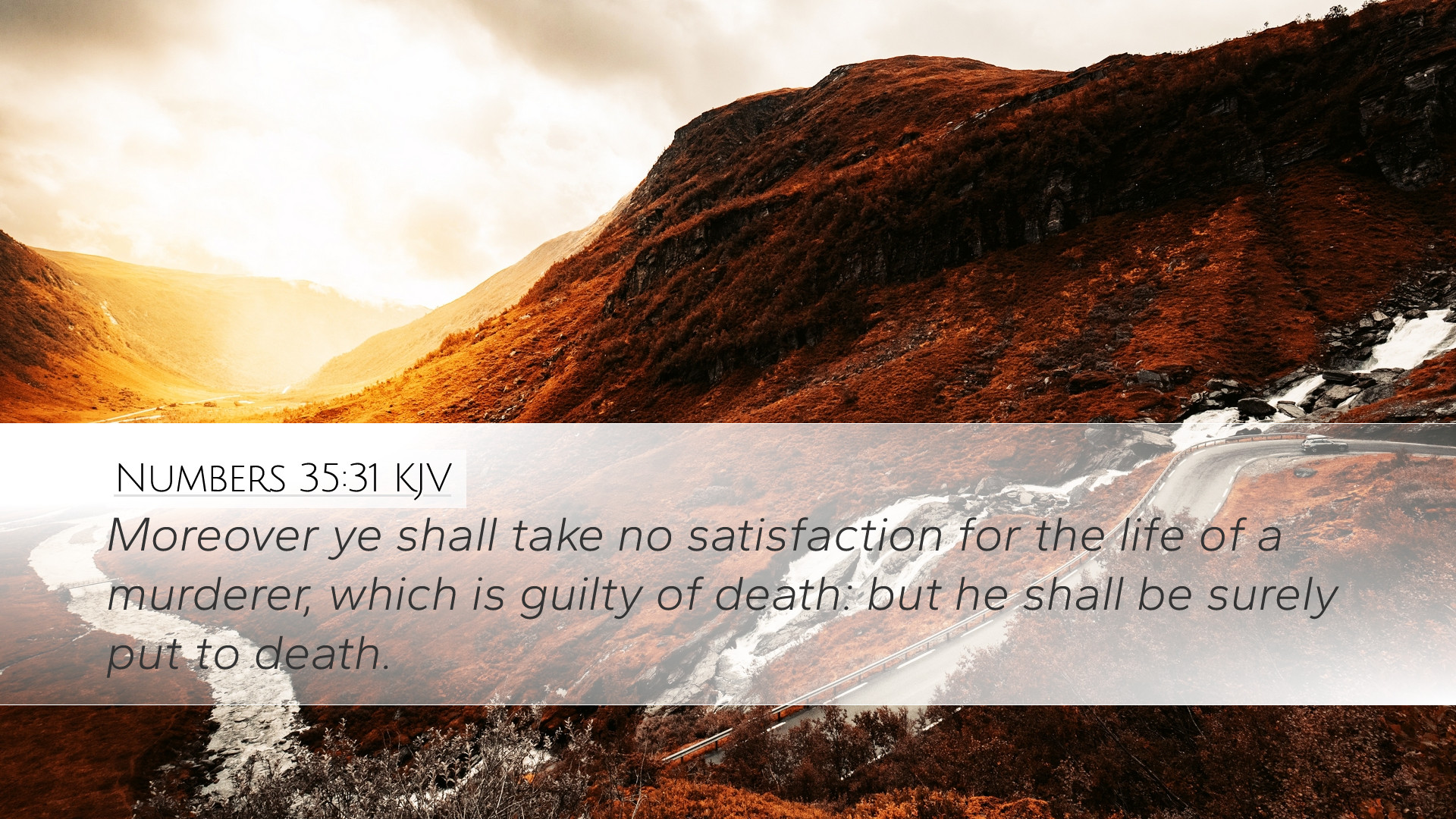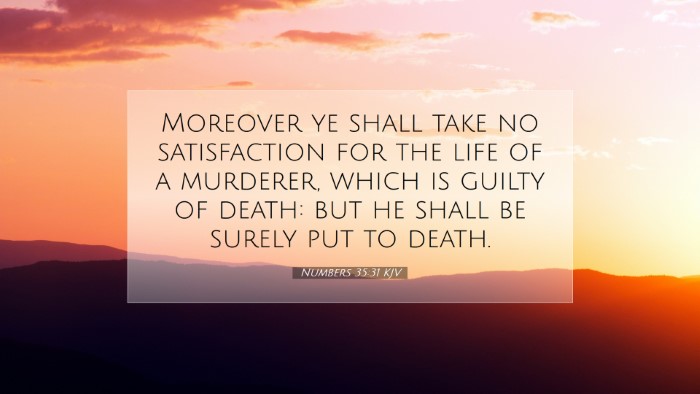Bible Commentary on Numbers 35:31
Verse: "Moreover ye shall take no satisfaction for the life of a murderer, which is guilty of death: but he shall surely be put to death."
Introduction
This verse arises in the context of the laws governing cities of refuge and the sanctity of life. Here, God emphasizes the serious nature of murder and the unacceptability of compensation or satisfaction for such a heinous act. Various public domain commentators provide insights that deepen our understanding of the legal, moral, and theological implications of this command.
Contextual Analysis
In Numbers 35, the establishment of cities of refuge highlights God’s provision for justice and mercy. The cities are designed to protect those who have killed unintentionally, yet this verse starkly contrasts that by addressing intentional murder, which is deserving of death. The gravity of such crimes cannot be reconciled with financial restitution; the penalty must be death.
Matthew Henry's Commentary
Matthew Henry elaborates on the seriousness of murder as a deliberate act that disrupts the image of God in humanity. He notes that God's law does not permit any form of compensation for the life of an individual taken through murder. In Henry’s view, this reflects at least three vital truths about God’s justice:
- The Value of Human Life: True justice acknowledges the sanctity of life, which is created in God's image. To seek satisfaction for murder undermines this value.
- Divine Judgment: Murder holds lasting consequences not only for individuals but also for society. The demand for death showcases God's commitment to justice.
- God’s Authority: This law underscores the supremacy of divine command in matters of life and death.
Albert Barnes' Notes
Albert Barnes, in his commentary, emphasizes that every murder requires justice and cannot be negated by monetary means. He explains that God's law views the act of murder as a severe violation that disrupts the fabric of community and justice.
Barnes further highlights the importance of the legal structure surrounding the cities of refuge, distinguishing between intentional and unintentional killing. The clear distinction is vital for understanding God's intention in these laws.
- Justice Over Mercy: In murder, mercy cannot be granted in the form of satisfaction. God requires the highest form of payment — the offender’s life.
- Social Implications: Societies are called to uphold justice, ensuring that the community bears witness to the seriousness of murder and the necessity for accountability.
Adam Clarke’s Commentary
Adam Clarke provides a theological lens on Numbers 35:31. He interprets God's injunction against accepting ransom for a murderer as rooted in the nature of sin and its consequences. Clarke posits that accepting a ransom would trivialize the severity of murder. He notes:
- The Integrity of God's Law: Clarke emphasizes that God’s law provides a moral compass, distinguishing the just penalty for crime from the potential for leniency that compromises justice.
- Theological Significance: The death penalty reflects God’s own character and holy nature — He is not indifferent to sin and will not allow it to go unpunished.
Theological Implications
Numbers 35:31 brings forth several theological implications concerning justice, divine authority, and the sacredness of life:
- God's Justice: This verse serves as a stark reminder that justice is paramount in the eyes of God. The seriousness of murder requires an uncompromised response, ensuring that societal and divine justice align.
- Authority of Divine Law: Accepting a ransom would suggest that human provisions could mitigate divine judgment, whereas this verse clearly indicates the supremacy of God’s justice.
- Impact on Community Ethics: The prohibition against ransom shapes a community’s moral framework, instilling a fear of God’s judgment that supports societal order and peace.
Conclusion
In conclusion, Numbers 35:31 profoundly emphasizes the gravity of murder and God’s unwavering commitment to justice. The insights provided by Matthew Henry, Albert Barnes, and Adam Clarke deepen our understanding of this biblical principle. This command encourages modern readers — pastors, students, and theologians alike — to appreciate the weight of sin and the need for justice in a society marred by violence.


